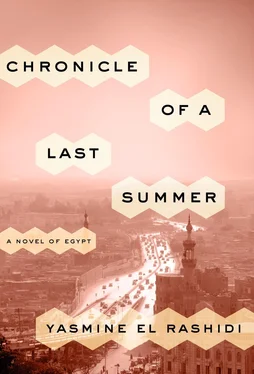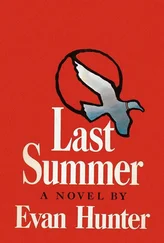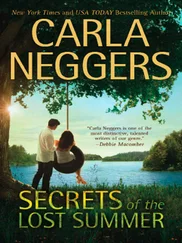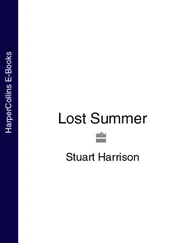—
Dido believes there is no space for real romance when we are fighting, but he wants his genes passed on. He wants the next generation to be comrades. We are too passive, he says, and have the capacity neither for revolution or for love. He uses a word, poranheyar , to explain our emptiness. A kind of devastation. Something passed on, by the generation before. A word he invented, hybrid Arabic and Russian. There isn’t a language for what we are living. We need our own vocabulary, not just new forms in literature and art. He is teaching himself Russian because he thinks that in their literature he might find answers, a language that speaks to all he feels about the politics of our times. He says this even though he doesn’t write or make art, but he consumes everything, watches every film he can, reads and rereads novels, goes to every art opening, opera, play. He was the one who had put a VHS tape of Chris Marker in my hands and told me not to do anything else until I had watched it. Art is what sustains him, he says, gives him the energy to keep going. Dido takes down cases all day, oral histories of torture, abuse, arrests, at the hands of state agents. Even their emotions, these victims, what they are left with, the trauma, have no terms or designations. Nobody has a voice, he says, nor a real sense of who they are. He insists that the streets are simmering, filled with people’s outrage, but our emotions are misplaced, making us silent.
I cross the square towards the university thinking about this, my next letter to A, how I will write to him about this feeling of being muted. Not having a language, gestural. How do you even initiate intimacy or the expression of desire? Mama never spoke about love. Nobody I knew who had ever really loved did. I imagined it was something Baba might have spoken of now. I turn the corner onto Mohamed Mahmoud Street. McDonald’s opened a few weeks ago, and the queue, now, is immense. I peer above it to find its end, tracing heads around a corner. It was on the exact same stretch of street that Baba heard the engines of jets, looked up, and saw the Star of David, on his way to volunteer to fight in that very war. It was one of those markers in memory that he said never went away. I felt deceived too, cheated out of a life, but I wasn’t sure why, or by what. I wondered. Was that also inherited, our listlessness, our sense of resignation? People, the older generation, Aunty and Uncle and all the others, would always somehow revert in conversation, even when talking about the price of food, to “ ’67.” Defeat, we are a defeated nation. But even though Nasser had lied, people still wanted him to stay. They pleaded, took to the streets in millions when he resigned. Baba had spoken about that so often that even as a six-year-old I could recite those stories by heart. They stayed with me. I had asked, Why did you want him to stay Baba? He had stared into the air, looked around, then peered down at me. Raised his shoulders, his eyebrows, pushed his glasses up from the tip of his nose. He muttered something about heroism, then said he wasn’t sure. He didn’t have an answer for me. I write this down in my journal now, under the heading “Notes on Defeat,” and beside an asterisk, a line about Uncle telling me years later that as a general rule in life, we act out of fear. We always choose what we know best, even if it means compromise.
I think about Baba more and more. At a point the idea of someone long absent turns from emotion into something of a mental exercise in remembering and deduction. The last time we were downtown together, Baba had described, wistfully, the cityscape during his student years. There had been little except villas, a few low-rise modernist buildings, and a palace ground divided. Open space was the city’s marker. One of the three buildings that had always been there, once with its own garden, now encased on three sides with high-rises, was the one where Abu Seif’s studio had been. Baba had wanted to study film, but Grandpapa hadn’t let him. Young men were to study finance, the only way to a respectable life. Either that or they went into the faculty of law. Baba couldn’t argue with Grandpapa, so he skipped classes and spent days in the studio. He had been there when Abu Seif made what became his canonical film chronicling the aftermath of defeat. The only film from the time that Nasser hadn’t banned. I think about this, Baba’s activism, the person he might have been before he became a businessman. I have his university ID on my desk at home. I stare into it. I remember certain things. The sound of his breath as he wound up his wristwatch. How he gestured with his hands as he spoke. His footsteps up the stairs, the long pause and then rattle as he brought out his keys. The movement of his face just before he broke into laughter. I can’t imagine him interested in film. I hear things here and there, but no one says much. What I know about him I construct, piece together, through stories, notes, remembered dreams, interpreting recurring ones. A theater professor asks me one day why I have chosen the art form I have, why I have chosen art at all. And then he tells me his own story.
—
Dido urges me to involve myself in politics, to make documentary films about dissidents rather than the cinematic ambitions of fictional cinéma vérité I have. It’s about time, he says. It’s important to connect with my anger. He says I can make art through activism and documentary, a different art, more potent. But that’s reality, not art. He is adamant, and becomes more insistent. Surprises me on campus between classes, giving me books inscribed and signed, Please. Love. He also passes by the house on odd Saturdays, bringing with him ten piastres’ worth of dried sunflower seeds, sitting beside me on a step in the garden, blowing perfect smoke rings from rolled cigarettes. I listen as he goes on about reform, and I start methodically recording our time together, flipping my notebook back and around and making that side for him. I start each entry with his mood, writing down everything I remember of our afternoons. He’s the only person I know who speaks of changing the country. Love and revolution are one, he says, they come together. In the past two years there have been gatherings of people in the square with signs chanting for Palestine. Nobody ever mentions Egypt. People generally don’t talk about the status quo even though everyone yearns for change. I do. It seems that politics is at the foreground and background of everything yet not something that can be impacted in any way. Mama wishes things were different, though she never says so in direct ways. But I can tell. Even when she smiles or laughs, I can see her sadness is much greater, a melancholy so steeped in who she is. I’m not sure anyone I know is deeply angry, even as they are unfulfilled, restless, somewhat resigned. Uncle complains about things, laments, talks about the incompetency of government, but not with the vehemence of anger that Dido suggests. I don’t think I am angry at all, as much as Dido insists we all are. He says we just don’t know how to express it, that we weren’t taught to be in touch with ourselves. The way we live our lives is no better than death.
Sociology. The professor is showing us slides of different types of drugs. The most common is a form of cannabis grown in the Nile Delta. We had been with him on a field trip to Qanater prison the week before. The prison is divided. There is the new prison, with tiled floors and a TV and shaded courtyard, where the men are kept, and the old one, where the women are. At the prison gates families are waiting to visit. They come each day with food, clothes, medicines, begging the guards to let them in. The guards make them wait. Take their names, IDs, the names of their loved ones. They also take tips. It’s no guarantee for entry. They still wait all day. Some spend the night. On the day of our visit, one woman is wailing. She’s been waiting for three days in the searing heat. She came all the way from Qena, seventeen hours by bus. She is large and has on layers. Sweat pours from under her scarf. She screams. This is unjust, have mercy on me. The guard opens the gate to let us in. She tries to push through. We are the first people they’ve let in for days. I feel bad, almost guilty. Two men grab her and push her back. They are the same men I saw in the Mugamma, the same men who came to the house, the same men I see downtown now, standing at street corners, watching. We were let in to the main courtyard. It looked like a construction site, strewn with sand and rubble, littered, lined on one side with three-story buildings. Cigarette butts were everywhere. As we walked toward the low-lying visiting area, the whistles and shrieks began. I turned my head. From the windows, behind bars, I could see the women. They stuck their arms out. Their legs. Tongues. There was a clamor, and it was hard to make out what they were saying, each one. At one building galabias were lifted to expose bare bodies. A pair of breasts dangled from a window, squeezed between the bars. The building is where the prostitutes are kept. They are the least harmful of all the inmates, none of them have killed, none have cut their husbands into cubes, none have drowned their children. None fed poison to families. None murdered for money. But they are the most disruptive , the prison warden explained. One woman screamed that she wanted to drink us all. Suck us. She was thirsty. Her thirst could never be quenched. We looked delicious. Everyone turned away. I tried to stare at her without making it known, out of the corner of my eyes.
Читать дальше

![Маргарет Миллар - Rose's Last Summer [= The Lively Corpse]](/books/384369/margaret-millar-rose-s-last-summer-the-lively-c-thumb.webp)










